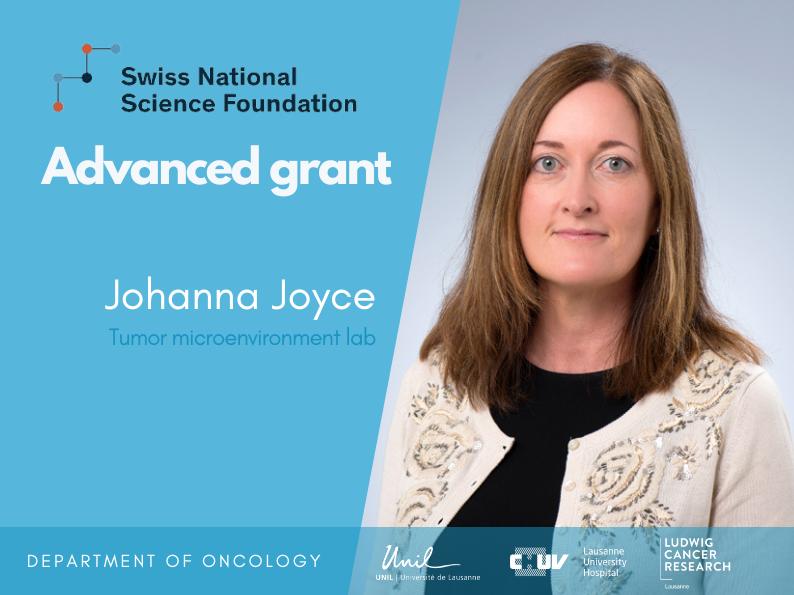English Français
Prof. Johanna Joyce awarded SNSF Advanced Grant
Professor Johanna Joyce, Department of oncology UNIL CHUV, and Full Member of the Ludwig Institute for Cancer Research, receives a prestigious SNSF Advanced Grant.

The SNSF Advanced grant will support the Joyce lab’s project: Investigating and Overcoming Immune Suppression in the Brain Metastasis Tumour Microenvironment.
Metastasis represents the final stage of malignant tumour progression, when cancer cells have successfully spread to a new organ and colonised it. Critically, some 90% of cancer patient deaths are attributed to metastasis, yet it remarkably remains the most poorly understood stage of tumour progression. This lack of knowledge is especially notable for brain metastasis, despite the brain being a frequent target organ for cancer cell dissemination, including from primary breast, lung and melanoma tumours. Recent projections from epidemiological analyses indicate that up to 40% of all patients diagnosed with cancer may go on to develop brain metastasis during the course of their disease progression.
Currently there are no curative therapies for patients with a brain metastasis diagnosis, and survival thereafter is unfortunately often measured by only a few months. Understanding the mechanisms underlying the development and progression of brain metastasis, including the dynamic interplay with the immune system, is therefore of utmost urgency to enable new therapies to be devised and translated to patients.
Identifying mechanisms of immune suppression in brain metastasis
Through the Joyce lab’s analysis of the brain tumour immune microenvironment in a large cohort of clinical samples, including brain metastases originating from different primary cancers, complex and diverse immune cell landscapes - including a subset with abundant T cells - were uncovered. These specific T cells are termed CD8+ cytotoxic T lymphocytes (CTLs), and are critical players in the immune response. Indeed, CTLs have been shown to effectively fight infection and kill cancer cells in other contexts. However, despite the presence of CTLs in certain brain metastasis samples, no durable immune response was mounted against the growing cancer in these patients. These results and additional unpublished data from the Joyce lab, indicate that there are diverse mechanisms of immune suppression blocking the anti-cancer functions of CTLs. The lab will now address the central question: why are these CTL responses not optimally engaged in brain metastasis?
A bridge between basic science and the clinic
The SNSF funded project seeks to significantly advance the mechanistic understanding of immune suppression in brain metastasis. By focusing on the brain tumour immune microenvironment, with the project acronym “BrainTIME”, this will address a current topic of intense investigation in the tumour immunology field, given that different immunotherapies are advancing to first-line treatments for many other cancer types. However, patients presenting with brain metastasis have been largely excluded from clinical trials, resulting in an absence of information for how immunotherapies might be harnessed to specifically treat intracranial metastases. This research will provide critical new insights and enable a bridge linking clinical analyses with fundamental research on brain metastasis tumour immunity, which will be essential for the development of successful therapies against this devastating disease.
The SNSF launched the 'SNSF Advanced Grants' funding scheme on behalf of the Swiss government, following Switzerland's non-association to Horizon Europe as of 2021. It is aimed at researchers who intended to apply for an ERC Advanced Grant to conduct innovative and high-risk research in Switzerland. Awardees must have a track record of outstanding research over the past ten years and be recognised as an international leader in their field. Twenty-four SNSF Advanced Grants have been awarded across Switzerland in this first funding cycle.